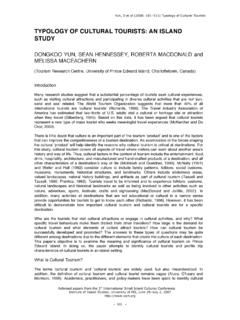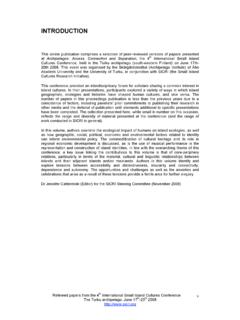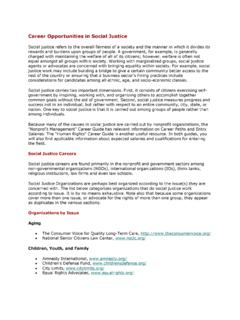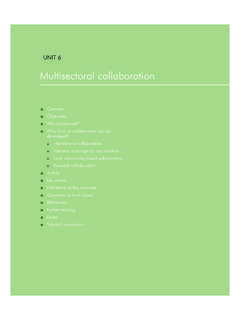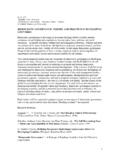Transcription of CULTURALLY BASED ETHICS AND RESOURCE …
1 Novaczek, I (2008: 42-49) CULTURALLY BASED ETHICS Refereed papers from the 3rd international Small Island Cultures Conference Institute of Island Studies, University of PEI, June 29 July 2, 2007 - 42 - CULTURALLY BASED ETHICS AND RESOURCE CONSERVATION: LEARNING FROM SMALL ISLANDS IREN NOVACZEK (University of Prince Edward Island, Charlottetown, Canada) Introduction: the Industrial Fisheries Management Paradigm In eastern Canada an expensive, science and technology BASED , federal fisheries management system has failed to prevent profound declines in the marine ecosystem, with tragic consequences for many coastal communities (MacDonald et al.)
2 , 2006). The dramatic closure of the Canadian east coast groundfishery in 1992 mirrored global troubles in industrial marine fisheries (FAO, 2006; Myers & Worm, 2003; Dulvy et al., 2003). An excess of destructive fishing power and fish processing capacity was (and often still is) subsidized by national governments bent on maximizing corporate profits and national exports (CEDF, 1994; Hutchings & Myers, 1995; Felt & Locke, 1995; Pauly et al., 2002), with tragic results that are exacerbated by pollution and climate change related degradation.
3 The fisheries- BASED livelihoods of at least 400 million people world-wide, and food security for a billion coastal dwellers (Berkes et al., 2001: 223) are at risk. Effective management of coastal development, fisheries and other human activities that impinge on marine ecosystems is urgently required but remains elusive. Tsing (2005) has pointed out the importance of recognizing wild environments as social landscapes imbued with cultural and spiritual meaning, especially for those people who live within them and depend on them for livelihoods.
4 The acknowledgement of the human, social aspects of the wild would lead us to doubt the rationale for industrial forms of economic development through which the wild is tamed and transmuted into money, without regard for the consequences to either the ecosystem or the human communities nested within it. Tsing was speaking of the forests of Borneo but the same holds true for the shallow marine waters plied by inshore fishers. The top-down, western industrial fisheries management paradigm leaves little or no room for the exercise of local power guided by local ecological knowledge and local value systems.
5 The alternative community- BASED management is a concept that has attracted the attention of academics, environmentalists and community development practitioners, but purely local management efforts cannot hope to control degradative forces that occur at regional, national and international scales. In small islands of the developing world and also in western industrial nations such as Canada a third alternative in state-citizen relations is being envisaged. This involves co-management that may be framed nationally and maintains the roles of national governments in standard setting, research and enforcement, but also incorporates local knowledge, responds effectively to local conditions and devolves some degree of decision-making to the community level (Berkes, 1994; Sen & Nielsen, 1996; Berkes et al.)
6 , 2001; Nielsen et al., 2004; Graham et al., 2006). In efforts to understand what an effective community role could be in co-management, remnants of pre-colonial cultural practices that have value for RESOURCE management at the local level have been analysed, particularly in the islands of southeast Asia and the South Pacific. These are now being resurrected and reinvented (Zerner, 1996; Novaczek et al., 2001; Novaczek et al., 2005) in the belief that fishers are more likely to comply with locally Novaczek, I (2008: 42-49) CULTURALLY BASED ETHICS Refereed papers from the 3rd international Small Island Cultures Conference Institute of Island Studies, University of PEI, June 29 July 2, 2007 - 43 - developed regulations as compared with rules imposed by distant bureaucracies (Pomeroy & Berkes, 1997).
7 In this paper several traditional, community- BASED management institutions on small islands are described, which have proved resilient over hundreds of years and which are now being augmented by elements of modern scientific management practice. A third case, in which traditional cultural ETHICS have been used as the basis for development of a community fishery in Canada, will also be considered as a potential model for future co-management arrangements.
8 All three systems are BASED on a cultural ethic that defines the essential relationship of humans with, and within, our supporting ecosystems. Each also pays attention to the local knowledge of fishers as a complement to academic and government- BASED scientific knowledge and methods, and engages the broader community in coastal and fisheries management. Such models are examined to provide guidance in development of effective fisheries co-management institutions in eastern Canada.
9 The Power of the Cultural Ethic in Traditional RESOURCE Management Practice In pre-colonial times, life in clan- BASED human societies was rich with ritual. Before the advent of institutional religions, animistic cultural practices commonly involved the appeasement of spirits in order to ensure fruitful hunts and harvests. Sometimes these rituals had value as ecological conservation practices, even though this may have been an inadvertent benefit (Zerner, 1996; Jones and Williams-Davidson, 2000).
10 Where conservation goals are explicit, ritual and ceremony contribute to the success of such institutions by publicly affirming the community members commitment and compliance (Johannes, 1998). Sasi in the Spice Islands of Indonesia: One example of cultural practice that has been recognized for its RESOURCE management attributes comes from the Spice Island of Haruku in Central Maluku, eastern Indonesia (Kissya, 1995). Haruku legends tell of a crocodile which lived in the local river in ancient times when people spoke to animals and were assisted by supernatural spirits.

